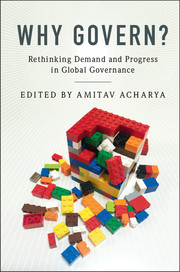Book contents
- Frontmatter
- Contents
- List of Figures
- List of Tables
- Notes on Contributors
- Acknowledgments
- List of Abbreviations
- 1 Rethinking Demand, Purpose and Progress in Global Governance: An Introduction
- Part I The Changing Concept of Global Governance
- 2 The Great Descent: ‘Global Governance’ in Historical and Theoretical Perspective
- 3 Who Is Liberal Now? Rising Powers and Global Norms
- 4 The Social Purposes of Global Governance
- Part II Issue Areas
- Bibliography
- Index
2 - The Great Descent: ‘Global Governance’ in Historical and Theoretical Perspective
from Part I - The Changing Concept of Global Governance
Published online by Cambridge University Press: 05 September 2016
- Frontmatter
- Contents
- List of Figures
- List of Tables
- Notes on Contributors
- Acknowledgments
- List of Abbreviations
- 1 Rethinking Demand, Purpose and Progress in Global Governance: An Introduction
- Part I The Changing Concept of Global Governance
- 2 The Great Descent: ‘Global Governance’ in Historical and Theoretical Perspective
- 3 Who Is Liberal Now? Rising Powers and Global Norms
- 4 The Social Purposes of Global Governance
- Part II Issue Areas
- Bibliography
- Index
Summary
Introduction
Efforts to think about, and bring about, world political arrangements that significantly reform, subsume or replace the Westphalian state-centric world order in order to deal with problems that are ‘global’ in character have been salient and growing features of both the world political scene and theorizing about world politics for at least the last century. Unfortunately, despite the growing number and significance of problems that appear to be in some significant way ‘global’ in character, political efforts to move beyond, or significantly alter, the state-centric world order to address these problems appear to be largely stymied, even in retreat, and many efforts for international cooperation, institutions and organizations are declining and weakening. There is a widespread sense that problems are growing faster than solutions, producing a ‘governance gap.’
As this sense of a critical shortfall has grown over the last several decades, it has become increasingly common to refer to the overall enterprise of ‘global problem solving’ as ‘global governance.’ This turn to ‘global governance’ is in part a reflection of the difficulties of global problem solving through other means, and in part related to a growing sense that new ways of ‘governance’ may be better suited to solving global problems than ‘government.’ Anything approaching a full assessment of ‘global governance’ in practice and theory is a vast and difficult undertaking, due to the sheer extent and diversity of contemporary activities that appear to be parts of ‘global governance,’ as well as the large policy and social science literatures on this topic. This chapter attempts to look at global governance with very wide lenses, looking for some larger patterns and trends across time, space and issue area.
The first main claim of this chapter is that ‘global governance’ is the culmination of two successive broad secular ‘descents’ regarding the locus or ‘level’ of authority, away from configurations which are vertical, hierarchical and ‘from above,’ and toward those which are horizontal, ‘republican’ and ‘from below.’ The first ‘descent’ has occurred over the last five hundred years, as empires came to be replaced with a state-system, and as internally hierarchical states have been progressively ‘republicanized.’ The second ‘descent’ has occurred across the last century, in thinking about various forms of ‘international government’ capable of effectively dealing with new sets of the problems of ‘global’ scope that are fundamentally related to technological change.
- Type
- Chapter
- Information
- Why Govern?Rethinking Demand and Progress in Global Governance, pp. 31 - 54Publisher: Cambridge University PressPrint publication year: 2016
- 3
- Cited by



